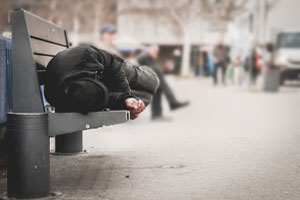
Two things are evident about how homelessness is addressed in America today. The problem is growing, and the present remedies are not working.
The failure does not come from a lack of will since many Americans feel compassion for the homeless. Our Lord’s parable of the Good Samaritan (Luke 10: 30-35) shows the Christian way to help those in need.
The problem is much more a political problem than an economic one. The media specialize in using naturally charitable impulses for political ends. The left’s misguided compassion hurts the homeless and all society.
The Compassionate Approach
The homeless issue is once again coming to the fore, albeit in a very different context. In the eighties, the common question was comparative. The press expressed it in words like, “Why are so many people homeless in the wealthiest nation in the world?”
Help Remove Jesus Bath Mat on Amazon
Liberals believed the answer was bureaucratic. Cities and counties built shelters, largely funded by grants from the federal government. Religious bureaucracies, notably Catholic Charities, endowed food pantries staffed by closely monitored volunteers.
Since drug abuse and mental disease issues were so much a part of the homeless issue, health departments established free clinics and needle exchange programs. Using grants from well-established “community organizations,” “advocates” set up shop to help the poor and homeless navigate the welfare system. Mayors unofficially passed the word to chiefs of police that “victimless crimes” like panhandling, public intoxication, loitering etc., should be lightly enforced, if at all.
Satanic Christ Porn-blasphemy at Walmart — Sign Petition
Continued Failure
Forty years later, the question is one of effectiveness. “Why are there still so many homeless people?”
Like many impulses, even those inclined toward virtue, compassion gets swept up into waves of emotion. Webster’s definition is straightforward, “sympathetic consciousness of others’ distress together with a desire to alleviate it.”
How Panera’s Socialist Bread Ruined Company
Yet, the crucial question is not helping but the best way to help.
A recent article by journalist Christopher Rufo has some excellent insights as to why past efforts failed. He looked at West Coast cities like San Francisco, Los Angeles and Seattle. One-third of the U.S. homeless population lives in three states—California, Oregon and Washington.
What Does Saint Thomas Aquinas Say About Marriage?
Evidence Contradicts Common Assumptions
Mr. Rufo dismantles many of the common assumptions about homelessness. He shows, for example, that homelessness is not caused by landlords who charge high rents. Indeed, Mr. Rufo found little difference between rental rates in the five cities where homelessness has increased and twenty other cities of the nation’s twenty-five largest cities where rents have decreased.
Another easy answer is that the homeless tend to relocate to warmer climates. Here again, the facts do not bear out this analysis. Miami and Tampa are as warm as Los Angeles. One could argue that the homeless prefer the less humid West. However, Riverside, California, fifty-four miles from Los Angeles, has fewer homeless than ten years ago.
Is It Immodest to Wear Deliberately Ripped Clothes?
The key to understanding the homeless problem is by looking towards the city of Houston, Texas. Mr. Rufo elaborates. “Houston’s policy exemplifies what [Mayor Sylvester] Turner calls a “tough love” approach. The city has built permanent supportive housing,…cobbled together a coalition of nonprofit partners, and lobbied the state government for more mental-health and addiction services. At the same time, Turner has enforced a strict ban on public camping and proposed a citywide campaign to discourage citizens from giving money to panhandlers.… The results have been stunning: between 2011 and 2019, Houston reduced its homeless population by 54 percent.”
Destructive Compassion and Chaos
Mr. Rufo has swerved into a fundamental truth. The homeless locate in cities that indulge them. Any society falls apart unless there is an authority that holds it together. Leniency breeds chaos. Misdirected compassion is not compassion but chaos in which everyone suffers.
As Russell Kirk states, “Order is the first need of the soul” (Kirk, Roots of American Order, 6). This same necessity of order can be affirmed about society: it is also the first need of the nation lest society decay into chaos. Freedom, justice, law, or virtue are all very important, but order is the first and most basic need.
Any effort to help the homeless must address the basic need for a moral order from which everything else will follow.
Photo Credit: © Srdjan – stock.adobe.com


